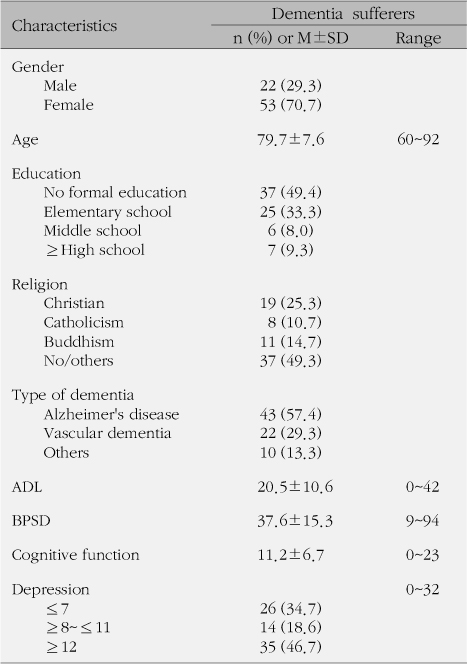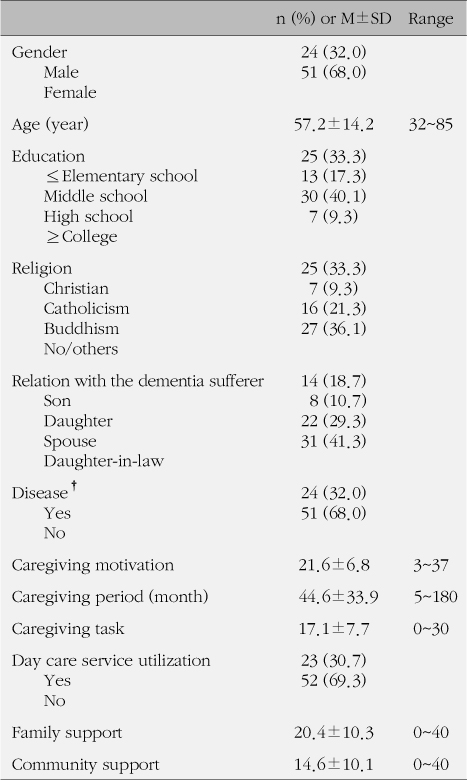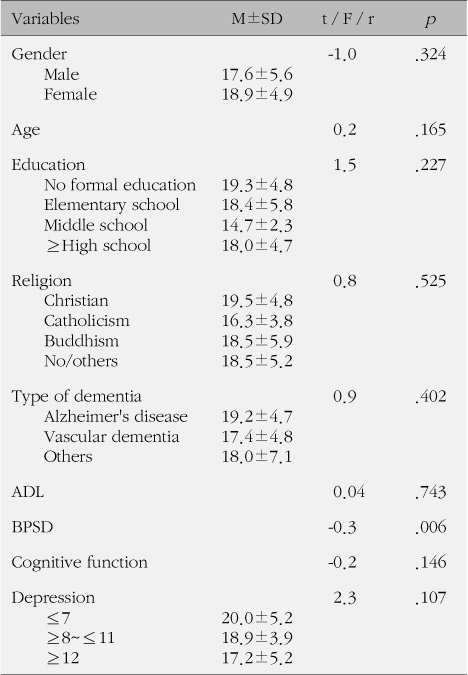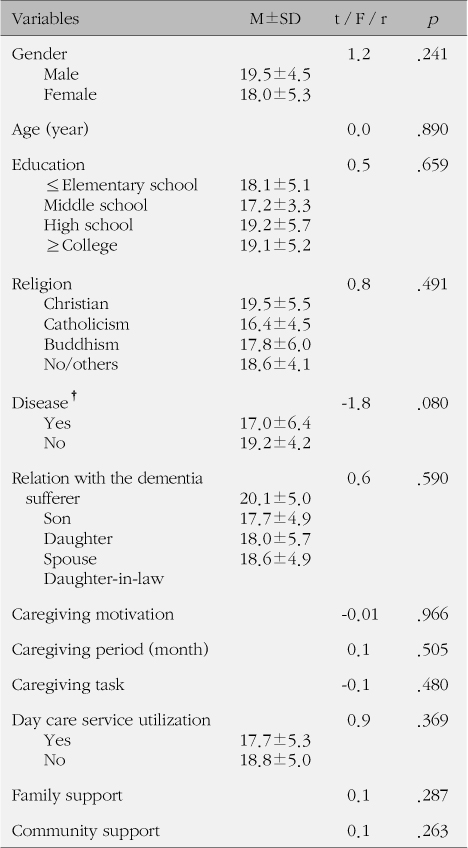References
1. Alexopoulos GS, Abrams RC, Young RC, Shamoian CA. Cornell scale for depression in dementia. Biol Psychiatry 1988;23(3):271–284.
2. Au A, Lai MK, Lau KM, Pan PC, Lam L, Thompson L, et al. Social support and well-being in dementia family caregivers: The mediating role of self-efficacy. Aging Ment Health 2009;13(5):761–768.
3. Bandura BA. Social foundations thought and action: A social cognitive theory Englewood Cliffs, NJ: Prentice-Hall; 1986.
4. Beekman NR. Family caregiving, dementia, and social support Ann Arbor, USA: The University of Michigan; 1999. Unpublished doctoral dissertation.
5. Cho MJ, Kim KW, Kim MD, Kim BJ, Kim SK, Kim SG, et al. Nationwide study on the prevalence of dementia in Korean elders (11-1351000-000227-01) Seoul: Ministry of Health & Welfare, Seoul National Hospital; 2008.
6. Chou KL, Chi I. Social comparison in Chinese older adults. Aging Ment Health 2001;6:242–254.
7. Chou KR, LaMontagne LL, Hepworth JT. Burden experienced by caregivers of relatives with dementtiia in Taiwan. Nurs Res 1999;48(4):206–214.
8. Epstein-Lubow G. Family caregiver health: What to do when a spouse or child needs help. Med Health R I 2009;92(3):106–107.
9. Evon D, Burns J. Process and outcome in cardiac rehabilitation: An examination of cross-lagged effects. J Consult Clin Psychol 2004;72:605–616.
10. Folstein MF, Folstein SE. 'Mini-mental state'. A practical method for grading the cognitive state of patient for the Clinician. J Psychiatr Res 1975;12(3):189–198.
11. Fortinsky RH, Kercher K, Burant CJ. Measurement and correlates of family caregiver self-efficacy for managing dementia. Aging Ment Health 2002;6:153–160.
12. Gilliam CM, Steffen AM. The relationship between caregiving self-efficacy and deprssive symptoms in dementia family caregivers. Aging Ment Health 2006;10(2):79–86.
13. Gonyea JG, O'Connor M, Carruth A, Boyle PA. Subjective appraisal of Alzheimer's disease care-giving: The role of self-efficacy and depressive symptoms in the experience of burden. Am J Alzheimers Dis Other Demen 2005;20(5):273–280.
14. Harwood DG, Ownby RL, Barker WW, Duara R. The factor structure of the Cornell Scale for Depression in Dementia among probable Alzheimer's disease patients. Am J Geriatr Psychiatry 1998;6(3):212–220.
15. Huang H, Shyu YL, Chen S, Hsu W. Caregiver self-efficacy for managing behavioural problems of older people with dementia in Taiwan correlates with care receivers' behavioural problems. J Clin Nurs 2009;18(18):2588–2595.
16. Kim SY, Kim JS, Youn HS. Predictors of depression and life satisfaction among family caregivers for demented elderly. J Korea Gerontol Soc 2004;24(2):111–128.
17. Kim YI. A study on quality of life and burden of primary caregiving of primary caregiver of demented elderly Iksan: Wonkang University; 2009. Unpublished master's thesis.
18. Kim JM, Shin IS, Yoon JS. Determinants of care burden of caregiver in patients with dementia. J Korean Neuropsychiatr Assoc 2001;40(6):1106–1113.
19. Kramer BJ, Kipnis S. Eldercare and work-role conflict: Toward an understanding of gender differences in caregiver burden. Gerontologist 1995;35(3):349–348.
20. Kwon JD. Study on the assessment of caregiver burden in caring for the demented elderly in Korea Seoul: Yonsei University; 1994. Unpublished doctoral dissertation.
21. Kwon YC, Park JH. Korean version of Mini-Mental State Examination (MMSE-K), Part I: Development of the test for the elderly. J Korean Neuropsychiatr Assoc 1989;28(1):125–135.
22. Lawton MP, Brody EM. Assessment of older people; Self-Maintaining and Instrumental activities of daily living. Gerontologist 1969;9(3):179–186.
23. Ma PS. A study on the people in charge of the demented-Especially people in the day care center or short stay service- Seoul: Ewha Womans University; 1999. Unpublished master's thesis.
26. Park JH, Cho SW, Shon HS. Reliability of functional status measurements in Elderly people. J Korean Neuropsychiatr Assoc 1995;34(2):475–483.
27. Rabinowitz YG, Mausbach BT, Gallagher-Thompson D. Self-efficacy as a moderator of the relationship between care recipient memory and behavioral problems and caregiver depression in female dementia caregivers. Alzheimer Dis Assoc Disord 2009;23(4):389–394.
28. Schulz R, Beach SR. Caregiving as a risk factor for mortality. JAMA 1999;282:2215–2219.
29. Sherbourne CD, Stewart AL. The MOS socialsupport survey. Soc Sci Med 1991;32(6):705–714.
30. Steffen AM, Mckibbin C, Zeiss AM, Gallagher-Thompson D, Bandura A. The revised scale for Caregiving self-efficacy: Reliability and vality studies. J Gerontol B Psychol Sci Soc Sci 2002;57(1):P74–P86.
31. Sung KH. Burden and depression of caregivers according to cognitive function and daily living ability of dementia patients Seoul: Ewha Womans University; 2006. Unpublished master's thesis.
32. Teri L, Truax P, Logsdon R, Uomoto J, Zarit S, Vitaliano PP. Assessment of behavioral problems in dementia: The revised memory and behavior problems checklist. Psychol Aging 1992;7(4):622–631.




